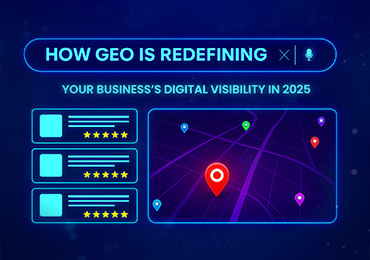- Admin
- September 24th, 2025
- 6 min Read
How GEO Is Redefining Your Business’s Digital Visibility in 2025
The Search Shift You Can’t Ignore
Think about your own habits. When you need an answer—whether it’s the best marketing strategy, the nearest coffee shop, or a product comparison—do you scroll through Google, or do you just ask ChatGPT, Gemini, or Copilot?
For millions of people in 2025, the answer is increasingly AI tools first, search engines second. This change is not subtle. It’s fundamentally reshaping how people discover information, make decisions, and engage with businesses.
Recent studies highlight the scale of this disruption:
- Organic traffic is falling fast: Google’s AI-powered “Overviews” can cause traffic drops of 15–64% across industries, while nearly 60% of searches now result in zero clicks (Forbes, 2025).
- AI adoption is surging: U.S. usage of AI tools jumped from 8% in 2023 to 38% in 2025, while still, 95% of people continue to use search engines monthly (Search Engine Land, 2025).
- AI search is gaining traction: In February 2025, 71.5% of respondents reported using AI tools for search, although nearly 80% still preferred Google or Bing for broad queries (Search Engine Land, 2025).
This paints a clear picture: Google isn’t dead, but it’s no longer the only gateway to discovery. To thrive in this new landscape, businesses must optimize for both traditional search engines and generative AI platforms. That’s where Generative Engine Optimization (GEO) comes in.
What Is GEO, and How Is It Different from SEO?
Generative Engine Optimization (GEO) is the practice of shaping your content so that AI engines like ChatGPT, Gemini, Bing Copilot, and Perplexity select, cite, and recommend your business directly in their answers.
Here’s how it differs from traditional SEO:
| Aspect | Traditional SEO | GEO (Generative Engine Optimization) |
|---|---|---|
| Ranking Target | Google, Bing SERPs | AI engines: ChatGPT, Gemini, Perplexity |
| User Experience | Browsing lists of links | Direct, conversational answers |
| Optimization Focus | Keywords, backlinks, metadata | Authority, clarity, structured data |
| Outcome | Click-throughs to websites | Branded mentions in zero-click AI answers |
| Competitive Edge | Standard practice | Early adopter advantage |
If SEO was about being seen, GEO is about being spoken for.
Why GEO Is Urgent in 2025
1. AI Search Is Becoming the Default
AI platforms are no longer side tools—they’re becoming the first stop for knowledge and decision-making. ChatGPT alone reached 2 billion visits in May 2025, a 30% surge since late 2024 (Open Partners, 2025).
2. Organic Traffic Is Declining
Gartner forecasts a 25% drop in traditional organic search volume by 2026, as users turn to generative AI for instant answers (Gartner, 2024). Businesses relying only on SEO will see diminishing returns.
3. Consumer Behavior Is Changing
AI isn’t just replacing search—it’s replacing discovery. By 2025, 22% of shopping journeys begin on AI platforms, more than doubling in just two years (Open Partners, 2025).
4. AI Engagement Is Rising
Prompt usage on ChatGPT grew nearly 70% from January to June 2025, with shopping-related prompts doubling to nearly 10% of all activity. Even more striking: click-through rates from ChatGPT answers tripled in just three months, climbing from 2.2% in March to 5.7% in June (Bain & Co, 2025).
This means users aren’t just asking AI questions—they’re taking action based on AI recommendations.
The Risks of Ignoring GEO
- Enhanced Brand Presence: Your business appears directly in trusted AI answers, not buried in results pages.
- Improved User Experience: GEO content is concise, authoritative, and AI-friendly—earning user trust.
- Local and Personalized Visibility: Generative engines adapt answers to user context, making GEO vital for local intent searches.
- Competitive Advantage: Early GEO adopters are seeing up to 40% boosts in visibility and in some cases 100% growth in AI-driven inquiries.
In a world where search traffic is declining, but AI-driven actions are rising, ignoring GEO isn’t just risky—it’s business sabotage.
Tangible Benefits of GEO
- Enhanced Brand Presence: Your business appears directly in trusted AI answers, not buried in results pages.
- Improved User Experience: GEO content is concise, authoritative, and AI-friendly—earning user trust.
- Local and Personalized Visibility: Generative engines adapt answers to user context, making GEO vital for local intent searches.
- Competitive Advantage: Early GEO adopters are seeing up to 40% boosts in visibility and in some cases 100% growth in AI-driven inquiries.
How to Prepare Your Business for GEO
Restructure Your Content
- Use schema markup and structured formats (FAQs, Q&A).
- Focus on clear, digestible answers.
- Cite authoritative sources to boost credibility.
Monitor AI Mentions
- Track how your brand appears in ChatGPT, Gemini, and other engines.
- Adapt content to maintain or improve your placement.
Blend GEO with SEO
- Keep your SEO foundation strong—it still drives significant discovery.
- Layer GEO on top to capture the AI-driven zero-click market.
Frequently Asked Questions
1. Will GEO replace SEO?
No. GEO complements SEO. You need both to maximize visibility across traditional and generative engines.
2. Is GEO relevant for small businesses?
Yes—perhaps even more so. GEO helps smaller brands punch above their weight by getting cited in AI answers without relying solely on expensive ad campaigns.
3. How soon should we adopt GEO?
Immediately. With traffic already declining and AI adoption surging, early adoption secures a lasting competitive edge.



